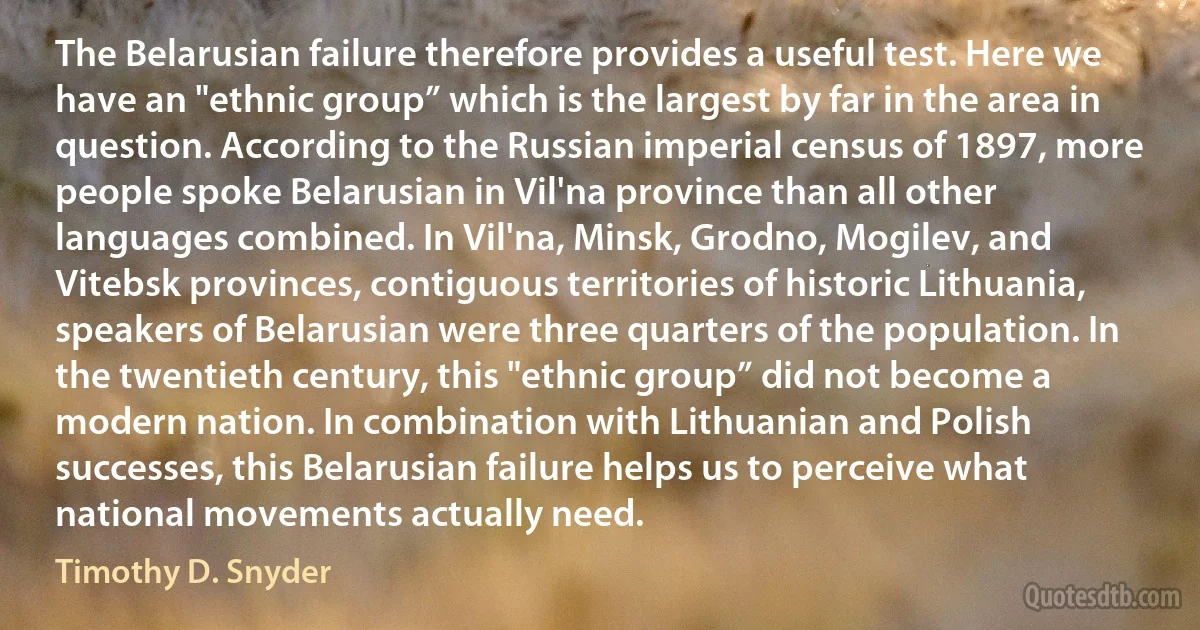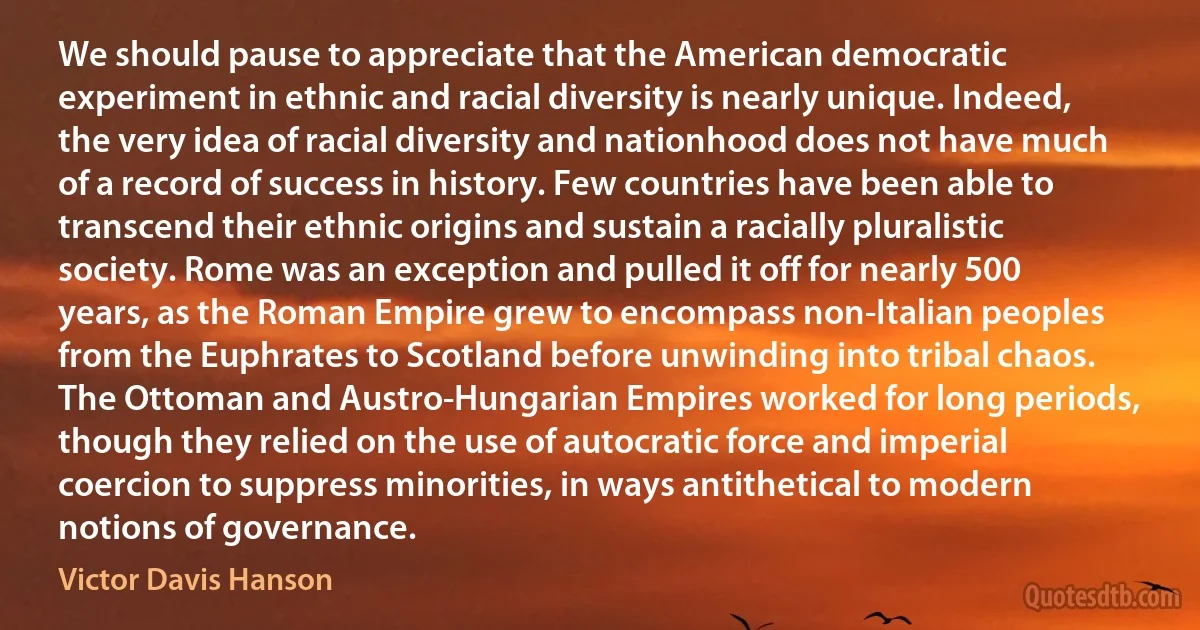Imperial Quotes - page 5
I am delighted to inform you that in yesterday's sitting of the Cabinet it was unanimously agreed that your application of last August for authority to return to Germany should be sanctioned in principle...While acquainting Your Imperial Highness of the Cabinet's decision, I cannot forbear expressing my own personal pleasure that this decision was given by the Cabinet on my proposal, and, as I may permit myself to add, as reached unanimously and without objection or criticism, after my statement had been heard.

Gustav Stresemann
When most Italian artists of my own generation were afraid to be too 'modern,' too 'international' in their style, not 'national' or 'imperial' enough, I was still left in peace, perhaps because I demanded so little recognition. My privacy was thus my protection and, in the eyes of the Grand Inquisitors of Italian art, I remained a provincial professor of etching, at the Fine Art Academy in Bologna.

Giorgio Morandi
The earlier political thinkers used the term "organization" in the broadest sense of the term, that is, with reference to the widest aspects of the patterns of political forces in a given state. Thus a political society might be organized as a monarchy, aristocracy, or democracy, as a city-state, feudal state, a national state, imperial state, or a world state. Emphasis was also placed on the organs of organization. These came to be standardized in the course of time under the categories of legislative, executive, and judicial organs, the combination of which in some form of balance was held to be the indispensable basis of sound organization.

Charles Edward Merriam
Doniger makes clear that no history focused on an imperial centre can capture the history of the Hindus here, any more than could such a state-focused story in the days before the arrival of the Muslims. But at the same time, the very structure of her presentation points also to the import-ance of the state as a locus for understanding how the history of the Hindus depends also on an engagement with broader currents of historical change extending outside India and linking this history to larger, worldwide processes.

Wendy Doniger
As I consider a future political and economic agreement with Great Russia to be the immutable aim of our foreign policy, we must attempt at least not to make an enemy of Russia...I refuse to support Poland, even if that means that Poland will be eaten up. On the contrary, I reckon with this, and if at the moment we cannot help Russia to regain her old Imperial frontiers, we should at least not hinder her from doing so...The same applies to Lithuania and Latvia.

Hans von Seeckt
Fundamental systemic crises are often associated with the decline of the dominant imperial power and its increasing inability to sustain the system over which it had previously presided. The profound instability of the interwar period owed much to Britain's inability to maintain its role.

Martin Jacques
I gained a first class degree in Physics at Imperial College London in 1968 and did research in solid state physics, but did not pursue meteorology matters until gaining an M.Sc. in astrophysics from Queen Mary College London in 1981, after which I investigated and attempted to construct theories of solar activity.

Piers Corbyn
She well knows that by once enlisting under other banners than her own, were they even the banners of foreign independence, she would involve herself beyond the power of extrication, in all the wars of interest and intrigue, of individual avarice, envy, and ambition, which assume the colors and usurp the standard of freedom. The fundamental maxims of her policy would insensibly change from liberty to force. The frontlet on her brows would no longer beam with the ineffable splendor of freedom and independence; but in its stead would soon be substituted an imperial diadem, flashing in false and tarnished lustre the murky radiance of dominion and power. She might become the dictatress of the world; she would be no longer the ruler of her own spirit. . . . Her glory is not dominion, but liberty. Her march is the march of the mind.

John Quincy Adams
Germany will always do the minimum to preserve the euro. Doing the minimum, though, will perpetuate the situation where the debtor countries in Europe have to pay tremendous premiums to refinance their debt. The result will be a Europe in which Germany is seen as an imperial power that will not be loved and admired by the rest of Europe - but hated and resisted, because it will perceived as an oppressive power.

George Soros
This vast land which Islam has dismembered in due course into the separate states of Afghanistan, Pakistan, Hindustan, and Bangladesh had been a single indivisible whole since times immemorial. Bharatavarsha had been termed by the ancients as the cradle of varNãšrama-dharma, witness to the wheel of the caturyugas, and the kShetra for chakravãrtya, spiritual as well as political. This historical memory and cultural tradition was alive as late as the imperial Guptas. Kalidasa had clothed it in immortal poetry in his far-famed RaghuvaMša.

Sita Ram Goel
Three conclusions can be safely drawn from a study of these 21 inscriptions. Firstly, the destruction of Hindu temples continued throughout the Muslim rule, from the date of its first establishment at Delhi in AD 1192 to its downfall with the death of the Mughal emperor Muhammad Shah in 1748. Secondly, the destruction took place all over India and was undertaken by rulers belonging to all Muslim dynasties, imperial as well as provincial. Thirdly, the destruction had no economic or political motive as has been proposed by Marxist scholars and Muslim apologists; it was inspired by religious zeal and regarded as a pious performance by Muslim kings and commanders, all of whom took considerable pride in it and sought blessing from Allãh and the Prophet. The iconoclasts, it may be added, have been idolised all along as paragons of faith, virtue, justice and generosity. These conclusions become clearer still when we come to evidence from Islamic literary sources.

Sita Ram Goel
The Mahabharata carries a complete picture of this cultural unity in its tîrtha-yãtrã-parva, which is part of the larger Vana-parva. The Pandavas accompany their Purohita, Dhaumya, on a long pilgrimage to all parts of Bharatavarsha. They pay their homage to many mountains, rivers, saMgamas, lakes, tanks, forest groves and other sacred shrines which had become hallowed by association with Gods and Goddesses, rishis and munis, satees and sãdhvees, heroes and heroines. And they feel fulfilled as they never did before or after in their long lives. The same Pandavas made an imperial conquest of the whole country, not once but twice and performed a rãjasûya yajña at the end of each triumph. But the Pandava empire is a faint memory of the forgotten past. On the other hand, the sacred spots which the Pandavas visited during their one and only pilgrimage, draw millions of devotees in our own days as they did in the distant past, long before the Pandavas appeared on the scene.

Sita Ram Goel
The fire put an end to the typically bustling business activities in downtown Beijing. But its psychological impact was much stronger than the financial losses. It left the Beijing residents in a constant state of terror and fear...Most missionary properties, residences of the foreign teachers at the Imperial University and the Eastern and the Southern Cathedrals were reduced to aches. Many Chinese priests and christian converts perished together in the roaring flames.

Xiang Lanxin



